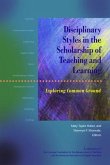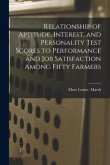This book is a must read for administration and human resources staff of colleges and universities who may be having difficulty with retaining highly qualified teaching instructors, academic professors, and adjunct faculty staff. The retention of faculty and staff of educational institutions has been of vital concern over the last decade, especially since the economic turmoil of 2008 and the aftermath of the great recession. The increase of online degrees has increased the competitiveness of finding, and keeping, qualified and valuable teaching staff. Retention of valuable teaching instructors ñ including adjunct, part-time, associate, and assistant professors is crucial in the survival and growth of academic institutions, as well as maintenance of accreditation credentialing and standards. This book focuses on a correlational research study, based on a faculty population in an institution of higher learning in Florida, that examined the relationship between perceived academic administrator leadership styles and the satisfaction of faculty members and transformational, transactional, and passive/avoidant leadership styles of academic administrators, with a dependent variable of job satisfaction for full-time faculty members. > Using this model, academic leaders are encouraged to refine their leadership styles on the basis of faculty members' indicated preferences to increase and improve academic instructor's retention, as well as their satisfaction in working for the school. Three key recommendations for action were developed. First, senior academic administrators should identify current transformational leaders in their organizations and perhaps use them as mentors to assist in the training and mentorship of current and future leaders. Second, academic administrators should recognize that leadership traits can be learned, and therefore, provide professional development and training opportunities in the areas of transformational leadership for present and future academic leaders. Finally, those who seek leadership positions in academia should become aware of the attributes of an effective higher education administrator, and work to develop an intrinsic understanding of and cultivate a skill-set of transformational leadership characteristics. Key Search Terms In Book: academic leaders, achievement-oriented leadership, active leadership, affective commitment, autocratic leadership, avoidant leadership, behavioral idealized influence, charismatic leadership, citizenship behaviors, communication styles, contingent reward leadership, developmental leadership, distributive justice, dualistic leadership, effective leadership, empowerment frameworks, exemplary leaders, exploitative innovation, faculty leadership, gender discrimination, hierarchical structure, idealized influence, institutional leadership, job satisfaction, laissez-faire leadership, leadership behaviors, leadership models, leadership theory, management by exception, mentors / protégés, organizational climate / organizational culture, participative leadership, passive/avoidant leadership, professional development, pseudo-transformational leaders, psychological empowerment, realistic leadership, reward and incentive system, scope of influence, shared governance model, structural empowerment, supportive leadership, top-down management style, total quality management (TQM), transactional leadership, transformational leadership
Hinweis: Dieser Artikel kann nur an eine deutsche Lieferadresse ausgeliefert werden.
Hinweis: Dieser Artikel kann nur an eine deutsche Lieferadresse ausgeliefert werden.








